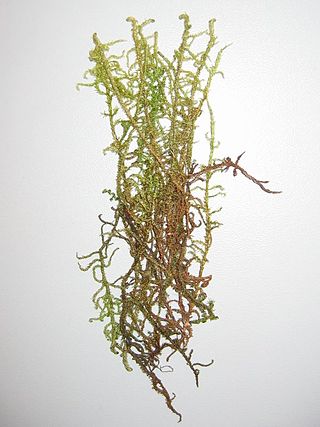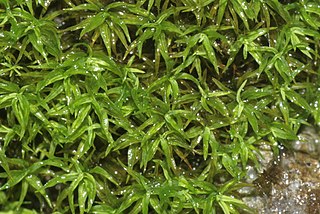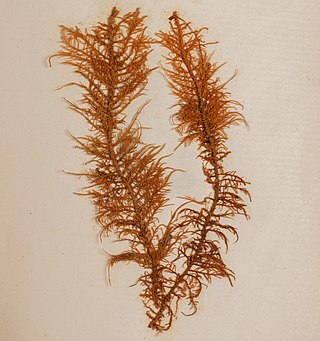
Racomitrium is a genus of mosses in the family Grimmiaceae established in 1818 by Samuel Elisée Bridel-Brideri. It contains the following species:

Thuidiaceae is a family of mosses within the order Hypnales. It includes many genera but the classification may need to be refined. The core genera are Thuidium, Thuidiopsis, Pelekium, Aequatoriella, Abietinella, Rauiella, Haplocladium and Actinothuidium form a clade but others currently placed in the family may belong elsewhere.

Taxiphyllum is a genus of mosses in the family Hypnaceae.

Pohlia is a genus of mosses in the family Mniaceae, found on all continents including Antarctica. Some of its species are native to multiple continents. The center of diversity is the Northern Hemisphere.

Didymodon is a genus of mosses belonging to the family Pottiaceae. The genus has a cosmopolitan distribution.

Plagiothecium is a genus of moss belonging to the family Plagiotheciaceae. It has a cosmopolitan distribution.

Rhynchostegium is a genus of pleurocarpous mosses belonging to the family Brachytheciaceae. The genus has a cosmopolitan distribution across different climatological regions except the polar regions, mostly in tropic to north temperate regions. The genus contains both aquatic and terrestrial species. The genus was named for their rostrate opercula. The type species of this genus is Rhynchostegium confertum (Dicks.) Schimp.

Tortella is a genus of mosses belonging to the family Pottiaceae. The genus was first described by Karl Müller and has a cosmopolitan distribution
Campylium is a genus of mosses belonging to the family Amblystegiaceae.

Drepanocladus is a genus of mosses belonging to the family Amblystegiaceae. It has a cosmopolitan distribution

Trichostomum is a genus of mosses belonging to the family Pottiaceae.
Helodium is a genus of mosses belonging to the family Helodiaceae.

Oxyrrhynchium is a genus of mosses belonging to the family Brachytheciaceae. The genus has a cosmopolitan distribution.

Thuidiopsis is a genus of mosses belonging to the family Thuidiaceae.
Herzogiella is a genus of mosses belonging to the family Hypnaceae.
Catagonium is a genus of moss from the family Catagoniaceae. It is found all over the world, especially the Tropical Region.
Catagonium brevicaudatum is a species of moss from the genus Catagonium. It was founded by Müller and Brotherus in 1897. It is commonly found in the Americas. Before the name Catagonium brevicaudatum, it has other names including: Eucatagonium brevicaudatum, Hypnum brevicaudatum, and Isopterygium brevicaudatum. The stems of Catagonium brevicaudatum are mostly 2–10 cm.
Catagonium complanatum is a species of moss from the genus Catagonium. It has discovered by Jules Cardot and Viktor Ferdinand Brotherus in 1925. Before the name Catagonium complanatum, it had a basionym named Calliergonella complanata by Cardot & Broth.
Catagonium gracile is a species of moss from the genus Catagonium. It was described by Viktor Ferdinand Brotherus in 1908.

Plagiotheciaceae is a family of mosses from the order Hypnales. It is found almost nearly worldwide, including Antarctica. Located primarily in temperate latitudes and at higher elevations in the tropics.












